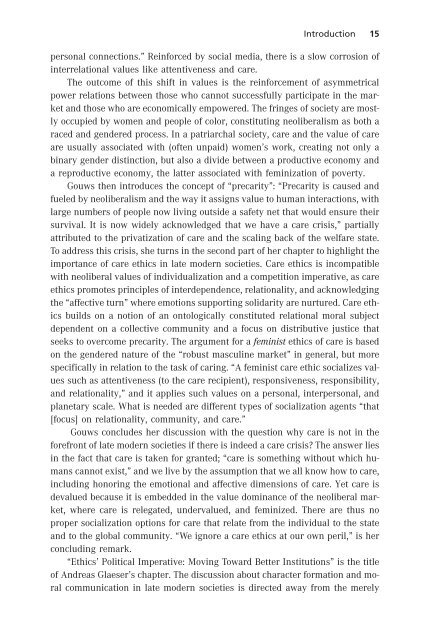Piet Naudé | Michael Welker | John Witte, Jr. (Eds.): The Impact of Political Economy (Leseprobe)
In our late modern pluralistic societies, there are tensions and complementarities between a plurality of individual and social claims and activities to shape societal life and a constructive pluralism of what is known as social systems. The latter provide normative codes and powers emanating from the areas of law, religion, the family, the market, the media, education, academic research, health care, defense and politics. A better understanding and steering of this complex division of powers is crucial for the common good and for freedom and peace. In this volume, a multi-disciplinary team of experts from Germany, Italy, Australia, the UK, the USA, and South Africa bring their conceptual, empirical and historical insights to bear in three broad sections: »The moral dimension of social systems«; »The interaction of religion, law and education with political systems«; and »The moral (mal)-formation evident in case studies on the global financial crisis and social media«.
In our late modern pluralistic societies, there are tensions and complementarities between a plurality of individual and social claims and activities to shape societal life and a constructive pluralism of what is known as social systems. The latter provide normative codes and powers emanating from the areas of law, religion, the family, the market, the media, education, academic research, health care, defense and politics. A better understanding and steering of this complex division of powers is crucial for the common good and for freedom and peace.
In this volume, a multi-disciplinary team of experts from Germany, Italy, Australia, the UK, the USA, and South Africa bring their conceptual, empirical and historical insights to bear in three broad sections: »The moral dimension of social systems«; »The interaction of religion, law and education with political systems«; and »The moral (mal)-formation evident in case studies on the global financial crisis and social media«.
You also want an ePaper? Increase the reach of your titles
YUMPU automatically turns print PDFs into web optimized ePapers that Google loves.
Introduction 15<br />
personal connections.” Reinforced by social media, there isaslow corrosion <strong>of</strong><br />
interrelational values like attentiveness and care.<br />
<strong>The</strong> outcome <strong>of</strong> this shift invalues is the reinforcement <strong>of</strong>asymmetrical<br />
power relations between those who cannot successfully participate in the market<br />
and those who are economically empowered. <strong>The</strong> fringes <strong>of</strong> societyare mostly<br />
occupied by women and people <strong>of</strong> color, constituting neoliberalism as both a<br />
raced and gendered process. In apatriarchal society, care and the value <strong>of</strong> care<br />
are usually associated with (<strong>of</strong>ten unpaid) women’s work, creating not only a<br />
binary gender distinction, but also adivide between aproductive economy and<br />
areproductive economy, the latter associated with feminization <strong>of</strong> poverty.<br />
Gouws then introduces the concept <strong>of</strong> “precarity”: “Precarity is caused and<br />
fueled by neoliberalism and the way it assigns value to human interactions, with<br />
large numbers <strong>of</strong> people now living outside asafety net that would ensure their<br />
survival. It is now widely acknowledged that we have acare crisis,” partially<br />
attributed tothe privatization <strong>of</strong> care and the scaling back <strong>of</strong> the welfare state.<br />
To address this crisis, she turns in the second part <strong>of</strong> her chapter to highlight the<br />
importance <strong>of</strong> care ethics in late modern societies. Care ethics is incompatible<br />
with neoliberalvalues <strong>of</strong> individualization and acompetition imperative, as care<br />
ethics promotes principles <strong>of</strong> interdependence, relationality, and acknowledging<br />
the “affective turn” where emotions supporting solidarity are nurtured. Care ethics<br />
builds on anotion <strong>of</strong>anontologically constituted relational moral subject<br />
dependent on acollective community and afocus on distributive justice that<br />
seeks to overcome precarity. <strong>The</strong> argument for a feminist ethics <strong>of</strong> care is based<br />
on the gendered nature <strong>of</strong> the “robust masculine market” in general, but more<br />
specifically in relation to the task<strong>of</strong>caring. “Afeminist care ethicsocializes values<br />
such as attentiveness (to the care recipient), responsiveness, responsibility,<br />
and relationality,” and it applies such values on apersonal, interpersonal, and<br />
planetary scale. What is needed are different types <strong>of</strong>socialization agents “that<br />
[focus] on relationality, community, and care.”<br />
Gouws concludes her discussion with the question why care isnot in the<br />
forefront <strong>of</strong> late modern societies if thereisindeed acare crisis?<strong>The</strong> answer lies<br />
in the fact that care istaken for granted; “care is something without which humans<br />
cannotexist,” and we live by the assumptionthat we all know how to care,<br />
including honoring the emotional and affective dimensions <strong>of</strong> care. Yet care is<br />
devalued because it is embedded in the value dominance <strong>of</strong> the neoliberal market,<br />
where care is relegated, undervalued, and feminized. <strong>The</strong>re are thus no<br />
proper socialization options for care that relate from the individual to the state<br />
and to the global community. “We ignore acare ethics at our own peril,” is her<br />
concluding remark.<br />
“Ethics’ <strong>Political</strong> Imperative: Moving Toward Better Institutions” is the title<br />
<strong>of</strong> Andreas Glaeser’schapter. <strong>The</strong> discussion aboutcharacter formation and moral<br />
communication in late modern societies is directed away from the merely
















